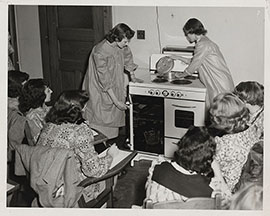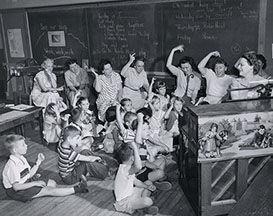Table of Contents
| Ask a question |
| Request a visit |
| Suggest a change or correction |
| Potentially harmful content statement |

Syracuse University College for Human Development Records
A description of its records at the Syracuse University Archives
Summary |
|
| Creator: | Syracuse University. -- College of Human Development. |
| Title: | Syracuse University College for Human Development Records |
| Dates: | 1917-2001 |
| Size: | 39 boxes (31.25 linear feet) |
| Abstract: | The College of Human Development Records contain administrative files, faculty meeting minutes, and other records pertaining to the College of Human Development and its predecessor, the College of Home Economics. |
| Language: | English |
| Repository: |
University Archives, Special Collections Research Center Syracuse University Libraries 222 Waverly Ave., Suite 600 Syracuse, NY 13244-2010 https://library.syracuse.edu/special-collections-research-center/university-archives |
Historical Note
The origins of the College for Human Development first took root in 1917, with the establishment of the first course in home economics at Syracuse University. The course was a result of a need expressed by Chancellor Day to supply “the need of government, food administration, institutions, etc., with trained women capable of large affairs and earning high salaries.”

By 1918 the School of Home Economics was opened, with Florence E. S. Knapp as its director and Slocum Hall as its home. In its first year, the enrollment was between 75 and 100 students. Many of these students would pursue a four year B.S. degree, where they would take two years of home economics courses and two years of courses in other selected subjects. The home economics curriculum was meant to cover every phase of housekeeping, as well as delve into business, law, civic responsibility, and public affairs. Knapp’s vision for the school was to educate all American women who would be publicly involved and ready to take care of the men returning from war. By 1921, the school’s success led to the founding of the College of Home Economics.
Annie MacLeod became dean of the college in 1928 and advocated the need for every female student to be able to support both herself and her home. She did so by stressing the education of family and child development as well as increasing space for professional work. By 1930, the Home Economics curriculum focused on teaching its students how to prepare food, estimate proportions and nutrition, shop economically, dress well, furnish a house, budget time and money, and care for children. The college boasted of alumnae who secured careers as dieticians or teachers as well as in places like food companies and test kitchens. This period also saw the opening of a nursery school and an initiative to bring home economics education to the Syracuse community through public workshops for mothers.
In 1934 MacLeod introduced the Orchid Dinner, a tradition of honoring the top student in the college. In that same year, graduate study at the college became available, and eight years later a PhD program was established. Also in 1942, the college welcomed its first male student, Charles E. DuBois, who was the surprise winner of the annual baking competition in his sophomore year. Around this time the college also began its annual summer educational conference, where top issues in the field of public health and family development were discussed. By the end of MacLeod’s time as dean in 1948, enrollment in the college had increased from 200 hundred students to about 500.
The 1950s saw a huge decline in enrollment under Dean Martha Eunice Hilton; however, there was an increase in male students. Many of these men had been Army chefs and supply sergeants during the war and through the GI Bill were now getting their degrees. Despite declining enrollment, curriculum at this time expanded to include journalism, teacher education, social work, and equipment in business.

In 1964, the college welcomed its first male professors, Dr. Robert S. Pickett and James E. Moore, and a new dean, Bernice Wright. Wright was determined to change the image of college, which she felt was inaccurately described under the guise of “home economics.” Dean Wright firmly believed in the importance of home economics as a diversified study that focused on the family as the basic unity in society. In 1971 the college was renamed the College for Human Development to reflect the expanded curriculum, which at this time included subjects like the science of nutrition, consumer economics and management, and environment and child development. Extracurricular opportunities were also expanded, such as at the Syracuse University Childhood Education and Day Care Center where students could teach. The day care was later renamed as the Bernice M. Wright Cooperative Nursing School to commemorate the dean’s contribution.
In the 1970s, the college saw its first male dean, Michael Marge, as well as its own convocation. The college was the first at the University to stage its own ceremony during graduation weekend. A lecture series in Dean Wright’s name was also established to bring top professionals in the field to interact with students.
The 1980s and 1990s welcomed a bit of revision at the college. Under Dean Jane Brush Lillestol the college was condensed down to three departments, which officially cut home economics from the curriculum. The college also took over the fashion design program from the College of Visual and Performing Arts in 1983, adopting a curriculum similar to traditional design schools. Through generous donations, the college was also able to open the Sue Ann Genet Art Gallery for Costume and Decorative Arts.
Under the next dean, Susan J. Crockett, the mission of the college was to address the health and well-being of families, their nutrition, their quality of their environment, and consumer decisions. In 1997, however, the college adopted an entirely revised mission, vision, and values statement. Using a new model of education, students were to take an active role in their education through applied learning. This method was meant to prepare leaders in the field and advance theory, research, and practice in fields related to the family, food, health, design, and the marketplace.
Four years later, however, the college was merged with the School of Social Work and the College of Nursing, creating the College of Human Services and Health Professions. Some departments of the college, like retail management and fashion design, were moved in to the College of Visual and Performing Arts.
Scope and Content
The Syracuse University College for Human Development Records contain material from 1917 to 2001 pertaining to the college and its predecessor, the College of Home Economics. Materials include faculty and dean files, meeting minutes, admission publications, subject files, newspaper clippings, scrapbooks, and material related to the college's 75th anniversary.
Restrictions
Access Restrictions
Please note that the collection is housed off-site, and advance notice is required to allow time to have the materials brought to the Reading Room on campus.
The collection is currently unprocessed and not available for research. Please contact SCRC for more information.
School, college and department records are restricted to the office of origin for 30 years. Faculty personnel files are restricted for 80 years from date of separation from the University. Requests to use restricted records must be obtained in writing from the office of origin.
Use Restrictions
Written permission must be obtained from the Syracuse University Archives and all relevant rights holders before publishing quotations, excerpts or images from any materials in this collection.
Related Material
Also available from the Archives are related materials in the Clipping Files, the Photograph Collection, and the papers of some of the school's faculty.
Selected Search Terms
Names
Subjects
Administrative Information
Preferred Citation
Preferred citation for this material is as follows:
Syracuse University College for Human Development Records,
University Archives,
Special Collections Research Center
Syracuse University Libraries
Acquisition Information
The College of Human Development Records were transferred to the Archives by the College of Home Economics starting in 1964 and were continuously accepted through 2014.
Processing Information
This collection is unprocessed.
Finding Aid Information
Created by: Maggie Teschler
Date: 2017
Revision history:
